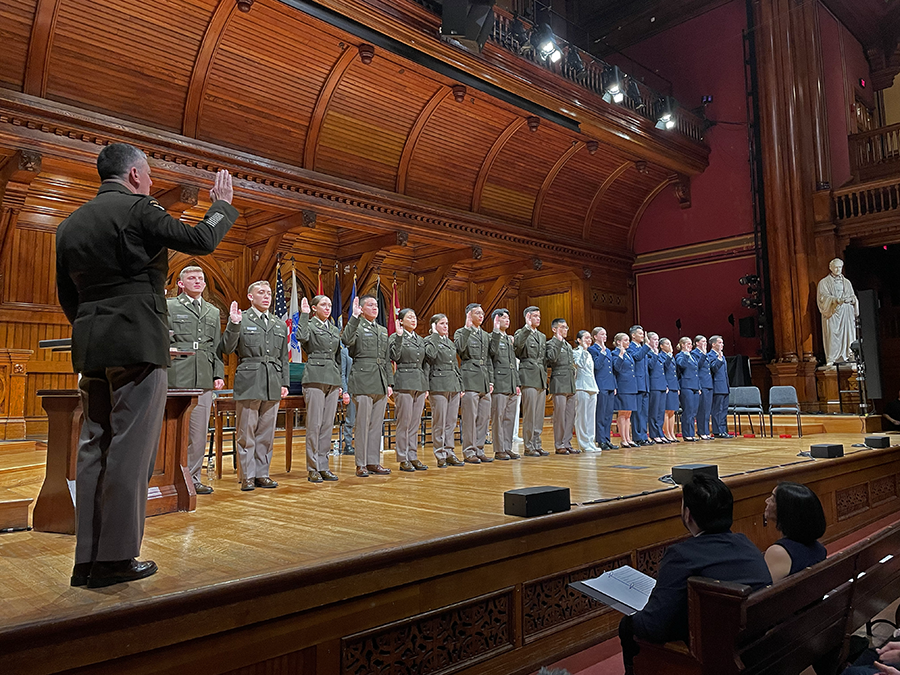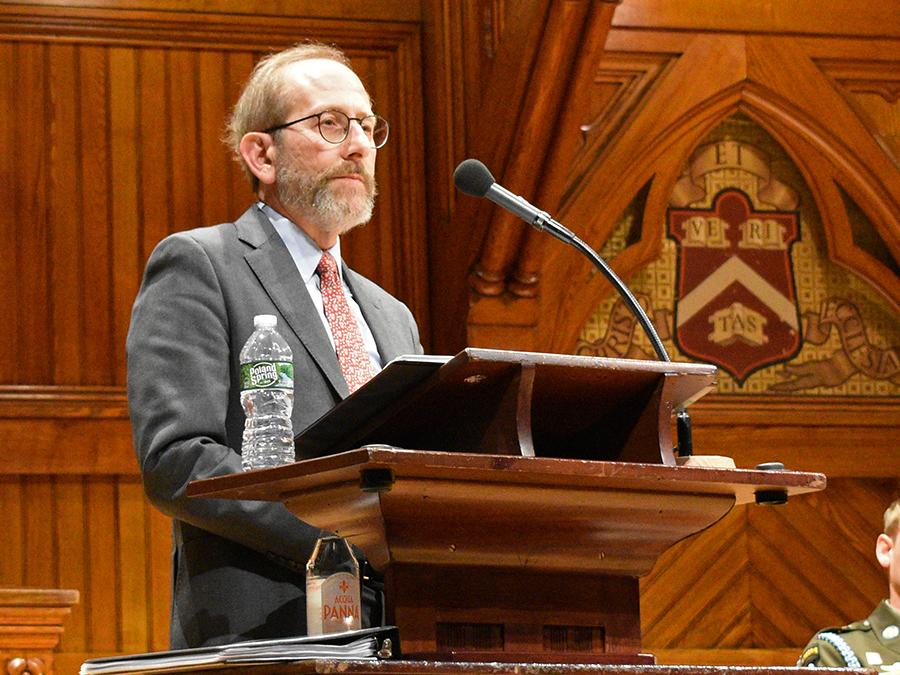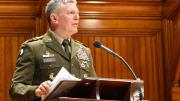In a time of “accelerating change and increasing challenges,” U.S. Army Lieutenant General Joseph “JP” McGee told Harvard’s 19 ROTC graduates on May 28, the armed services need “your skills and your leadership more critically than ever.”
McGee would certainly know. As the director of strategy, plans, and policy on the Joint Staff, he tracks geopolitical shifts across the globe, projecting future scenarios and military outcomes. Among the shifts are the “growing alignment among out potential adversaries: Russia, China, North Korea, and Iran,” he said, the continuing Russia-Ukraine conflict, and the contested border between India and Pakistan.
Seismic developments are also at play in the Middle East, he said. Meanwhile, emerging technologies and their applications, such as AI, social media, drones, nanotechnology, the cyberspace, and robotics, are redefining the nature of warfare and the meaning of success in combat.
McGee spoke to a packed crowd of family, friends, and other well-wishers in Sanders Theatre on Wednesday before administering the oath to the new officers. (A single protester wearing a keffiyeh interrupted the ceremony toward the end, shouting at the graduates to abide by laws concerning war crimes, and was roundly booed by the crowd.) In America, uniquely, “we do not swear an oath to a king or queen or president or a political party,” he told the group. The United States is the one country that instead “requires its armed forces to swear an oath to an idea encompassed in an ideal, and that ideal is the Constitution of the United States,” he continued, and “throughout history these ideals have brought hope to the oppressed and fear to the oppressor. They include freedom, equality, and rule of law.”

University President Alan M. Garber also spoke of political conflict and ideals. When U.K. Prime Minister Winston Churchill came to Sanders Theatre on September 6, 1943, in the midst of World War II, to receive an honorary degree, Garber said, he was later escorted to Tercentenary Theatre where “your predecessors, more than 7,000 officers in training, waited in great formation to greet him. Footage of the wartime leader punctuating an impromptu address to those assembled with taps of his walking stick is part of the long and storied history of our University.”

But what impresses Garber most, he said, was Churchill’s political exile: “The years during which he was all but alone in his warnings about German rearmament, ridiculed and shunned by those who chose to blind themselves to the truth that was unfolding before their eyes.” That “Churchill had the courage to persist, to keep his eyes open and unblinking [in] his confidence, even in the face of near constant opposition,” Garber said, “offers a powerful and enduring lesson for anyone who seeks to stand up for the truth.”
On behalf of the University, Garber gave each newly commissioned officer the second volume of William Manchester’s three-volume biography of Winston Churchill, The Last Lion, Winston Churchill Alone, 1932-1940.
McGee, who graduated from the United States Military Academy at West Point and served 10 deployments in support of combat operations, gave the graduates four pithy pieces of advice:
- “Respect the hierarchy of dos” (as in to do or not do). First: never do anything that is morally or ethically wrong, or illegal, McGee said. Second: do what your boss tells you to do. “If you make their priorities your priorities, you will be amazed at how much they’ll trust you and how successful you’ll be.” Third: do what you want to do.
- “Bloom where you’re planted.” In the military, jobs and locales are assigned. “The only thing you can control is your attitude when you get there.”
- Think about how you want to be remembered. Know that after you’re gone, people will be sitting around in a backyard with a fire pit, he said, having a few drinks and talking about you. “How do you want to be remembered? What legacy do you want to leave those people? Start with that in mind and that will help shape your actions.”
- “Be open to opportunities.” In the military, as in life, McGee said, “there’s not just one path. Diversions can be meaningful.” You don’t know “everything about the military yet, and you’re going to learn a lot…seize opportunities and make the most of them.”
Reflecting on the privilege of attending prestigious universities, McGee said he was reminded of a Bible verse his parents taught him as a child: “To whom much is given, much is expected.” To the graduates, he emphasized that given the massive changes around the world, and their own demonstrated talents and abilities, “From all of you, much will be expected.”
Members of the graduating ROTC cohort, all from the College, will enter the U.S. Army, Navy, and Air Force.
U.S. Army:
- *Etai Clyde, of Pforzheimer House, psychology concentrator, branch unassigned
- Second Lieutenant Matthew Fitch, of Pforzheimer House, biology concentrator, infantry
- Second Lieutenant Eytan Goldstein, of Dunster House, government concentrator, active duty, armor
- Second Lieutenant Chloe Hansen, of Currier House, integrative biology concentrator, active duty, field artillery
- Second Lieutenant Conner Huey, of Dunster House, government and history concentrator, U.S. Army Reserves, military intelligence
- *Emilie Kalkus, of Leverett House, government concentrator
- Second Lieutenant Morgan Kim, of Quincy House, integrative biology concentrator, medical services corps
- Second Lieutenant Carley Lehman, of Kirkland House, history and literature and government concentrator, to attend Duke University School of Law on educational delay to become a Judge Advocate General’s (JAG) Corps officer
- Second Lieutenant Andrew Lim, of Pforzheimer House, applied mathematics concentrator, active duty, cyber
- Second Lieutenant Matthew Sau, of Pforzheimer House, economics concentrator, U.S. Army Reserves, military intelligence
- Second Lieutenant Jack Schwab, of Mather House, computer science concentrator, active duty, signal corps, branch detailed infantry
- Second Lieutenant Isaac Tang, of Lowell House, government concentrator, active duty, infantry
- *William Wang, Harvard Business School master’s degree
U.S. Air Force:
- Second Lieutenant Sarah "Sally" Barksdale, of Pforzheimer House, history of science and molecular and cellular biology concentrator, active duty, operations research analyst
- Second Lieutenant Caitlin Beirne, of Dunster House, Near Eastern languages and civilizations and theater, dance, and media concentrator, Air Force Reserve, pilot
- Second Lieutenant Blake Chen, of Dunster House, chemistry concentrator, active duty, missile and nuclear operations
- *Emily McCallum, of Quincy House, applied mathematics concentrator, active duty, pilot
- Second Lieutenant Jenny Peters, of Leverett House, East Asian studies concentrator, active duty, intelligence
- Second Lieutenant Elizabeth "Corrie" Sasse, of Winthrop House, history of science concentrator, active duty, pilot
- Second Lieutenant Faith Schmidt, of Winthrop House, engineering sciences concentrator, active duty, pilot
- Second Lieutenant Charles “Trey” Whitehead III, of Lowell House, applied mathematics concentrator, active duty, operations research analyst
U.S. Navy
- Ensign Jasmine Zhang, of Lowell House, computer science concentrator, naval flight officer
*Recognized at the ceremony, to be commissioned at a later date








